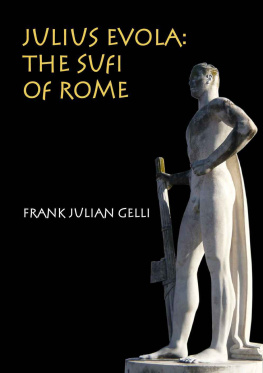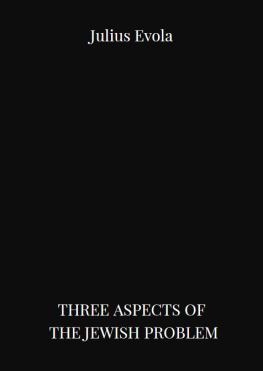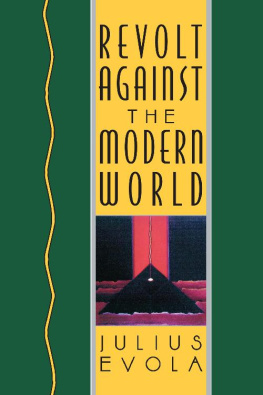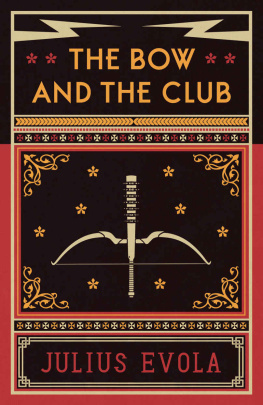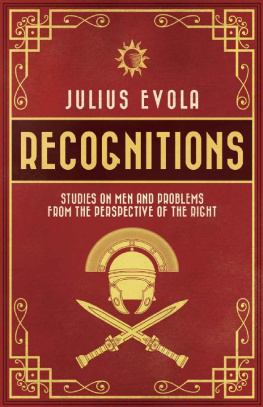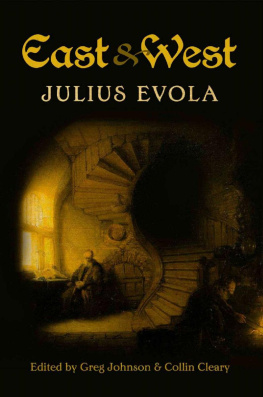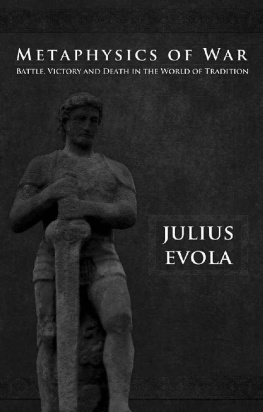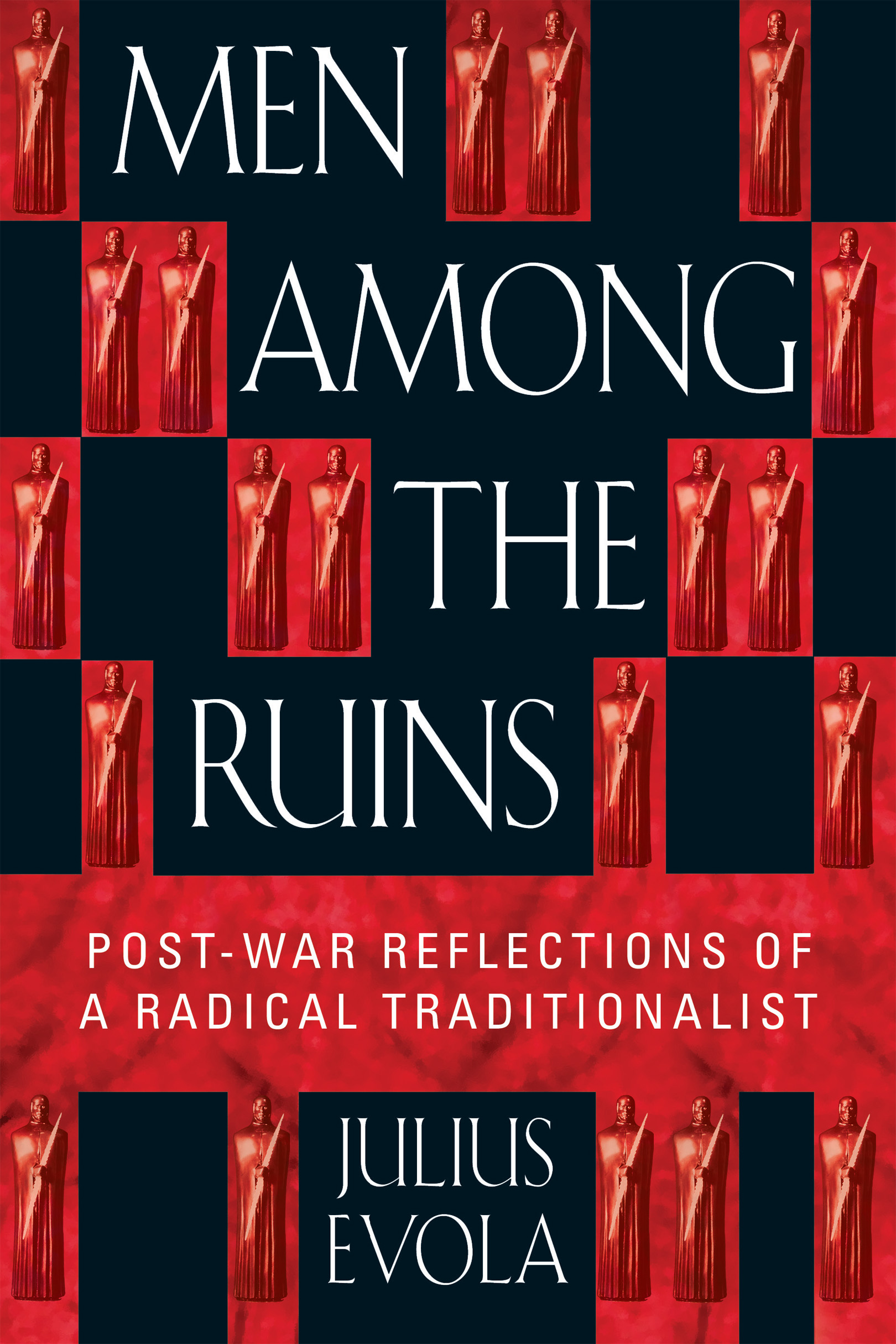
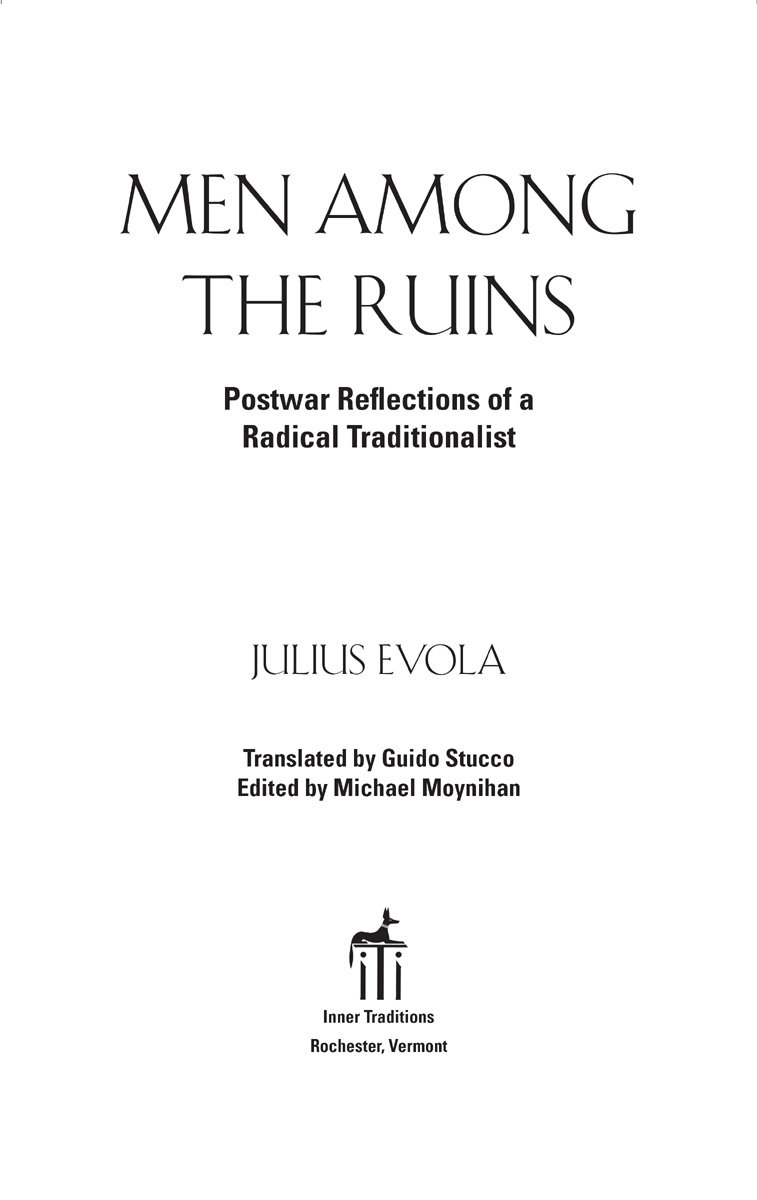
Evola is one of the most interesting minds of the [world]war generation. He has a really astoundingknowledge at his disposal.
Mircea Eliade,author of The Sacred and the Profane
A dazzling and interesting, but very dangerous author...
Hermann Hesse,author of Siddhartha
It is one of Evolas greatest merits that he combines aprodigious wealth of erudite detail with the gift of isolatingfrom their local conditioning the ideas ordisciplines that are of value to us.
Marguerite Yourcenar,author of Memoirs of Hadrian
Fire in ice and ice in fire... the eagles cry...the demon of action.
Ren Gunon,author of The Crisis of the Modern World
But this at least one cannot take away from [Evola]: hisconsistency, a universal education, and the courage tomake a daring, sovereign formulation.
Gerd-Klaus Kaltenbrunner,in Die Welt
One of the most difficult and ambiguous figuresin modern esotericism...
Richard Smoley,in Parabola

EDITORS NOTE

For the present English edition, we have endeavored to convey precisely Evolas own system of terminology. Thus the reader will note the capitalization of words like Tradition (when used by Evola to denote a transcendent spiritual tradition), Idea, Land, Leader, Mothers (Evola utilizes this term in a sense inspired by J. J. Bachofen), Orders (referring to Knightly Orders, Mnnerbnde, etc.), and the State. We have attempted to follow the precedent of the Italian edition (Rome: Volpe, 1972) as closely as possible in this respect. In addition, we have followed the now common scholarly practice of capitalizing the terms Fascism and Fascist only when they refer specifically to aspects of the historical Italian Fascism of the Mussolini regime. The terms are set in lower case when they refer to generic or less specific conceptions. The footnotes to the text are all from Evola, with the exception of occasional clarifications by the Editor, which are noted as such. We have also made a concerted effort to provide the bibliographical details of English translations (when these exist) for books cited by Evola.
Editors Acknowledgments
Sincere gratitude is expressed to the following people for their efforts with regard to this edition: Dr. H. T. Hansen for his new preface and for the use of his excellent introductory essay, Jon Graham at Inner Traditions, Martin Schwarz, Markus Wolff, Phillip Luciani for his initial support of the project, Dr. Stephen Flowers for helpful suggestions, and above all to Joscelyn Godwin for his many generous contributions and insights.
FOREWORD

Joscelyn Godwin
Now that we have passed the end of Evolas century, his voice is being heard more widely than it ever was in his lifetime. This is the ninth of his books to appear in English translation; many more have appeared in French and German, while in Italy even his innumerable journalistic writings are seeing the light again, and several periodicals are dedicated solely to his ideas.
This revival of an obscure Italian thinker is a remarkable phenomenon. At the present rate, it will not be long before Evola begins to receive the tribute of doctoral dissertations, scholarly articles, and academic conferences, prior to being established in whatever place is eventually accorded to him in the history of ideas. But two things will always act like gravel in the cogs of the academic machine, which is usually able to reduce any historical subject to a pure and emotionally anodyne state. The present publication is an attempt to deal with, though not to remove, one of these obstacles.
Evola is a rare example of universality in an age of specialization. He was universal not only in the horizontal domain, as philosopher, engineering student, artillery officer, Dadaist poet and painter, journalist, alpinist, scholar, linguist, Orientalist, and political commentatornot a bad record of achievement before his fiftieth yearbut in the vertical dimension as well.
It is this vertical dimension that constitutes one of the obstacles to the modern, agnostic approach, but which from Evolas own standpoint gave sense and value to what otherwise might appear as the thinly spread talents of a renaissance man or dilettante. One might call it a spiritual dimension, if that adjective were not so exhausted and if it did not carry connotations of a religiosity that Evola despised. His was not the spirituality of piety and mysticism, but the aspiration to what he understood to be the highest calling of man: the identity of Self and Absolute. His route to it led initially not through religion (he soon discarded his strict Catholic upbringing), but through philosophy, not just book-learned but also lived with a white-hot intensity comparable to that which left Nietzsche a burnt-out wreck. Soon after this, Evola plunged into a particularly esoteric form of occultism, again not of the literary or armchair type, but one that entailed trials, asceticisms, and a mastery of terrors that most of us can barely imagine. As a consequence, his character and ideals were fully formed before he was out of his twenties, and he remained true to them for the rest of his life. All that changed was a gradual refinement and a tireless filling-in of the steps on the ladder, from the heights of the Absolute (so beautifully expressed in The Doctrine of Awakening, Evolas book on Buddhism) down through the mysterious intermediate realms treated in his essays Magic as a Science of the Self, to the dirty world of politics, where Evola the journalist, as a fearless critic of the Fascist regime, seemed to lead a charmed life.
This brings us to the second and far more serious obstacle to the appreciation of Evolas thought in a social-democratic society: his extreme right-wing views. One might argue that his reputation would be best served by suppressing them, and especially by not publishing the present work in which they are given such blatant form. Men among the Ruins is, by any standard, far from being Evolas best work, and it should never be the gateway to his thought: that function belongs to his masterwork, Revolt Against the Modern World. However, if Evola is to be studied and understood even by thoseand this is increasingly the case in the United Stateswho cannot read him in the original language, it is academically dishonest to suppress anything.
The virtue of the academic approach resembles that of a bomb-disposal unit. That is to say, it can handle explosive materials at arms length, without harming either itself or others. It does this with the tools of rationality and scholarship, unsullied by emotionality or subjective references. At least, that is how it is supposed to work, and why there is such a concept as academic freedomthat is, the freedom to work on controversial topics and to come to ones own conclusions without political interference.
The bomb-disposal unit in the present publication consists of the exhaustive introductory study of Evolas politics by Dr. H. T. Hansen. This first appeared as a preface to the German language edition (Menschen inmitten von Ruinen, Tbingen, Zurich, Paris: Hohenrain-Verlag, 1991). It provides the factual and intellectual-historical basis that is essential for anyone who sets out in a serious spirit to criticize Evolas political ideas, because it will disabuse them of hearsay and prejudgments, and allow for the informed and open debate that such matters deserveone can scarcely call them controversial, since there is virtually no controversy to be had about them. Those who react to Evolas text only on an emotional level are, unfortunately, beyond such assistance; it would be better for them to save their blood pressure by not reading him at all.
Next page

